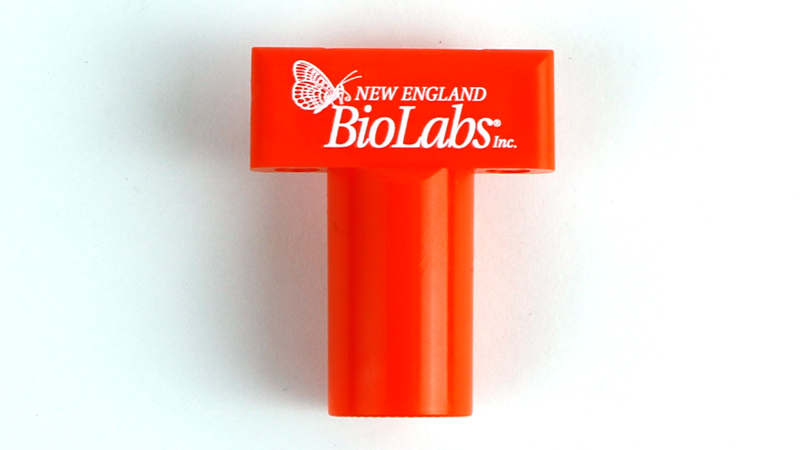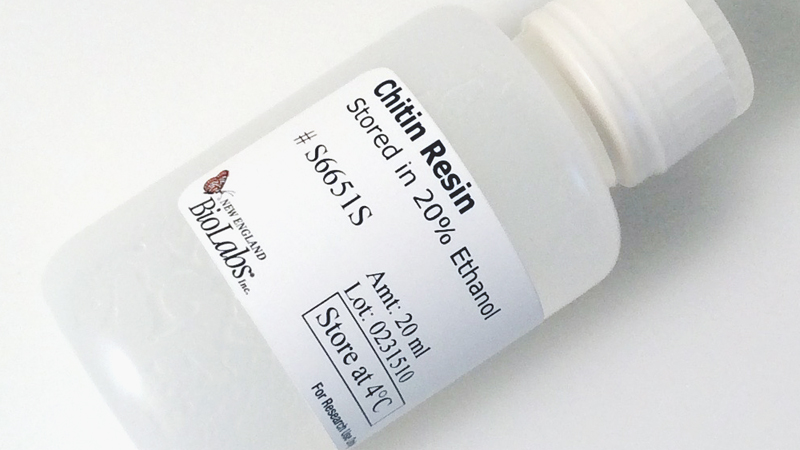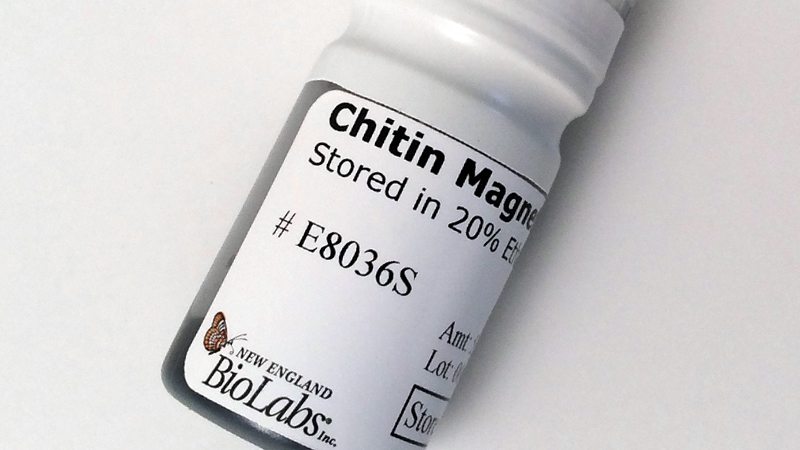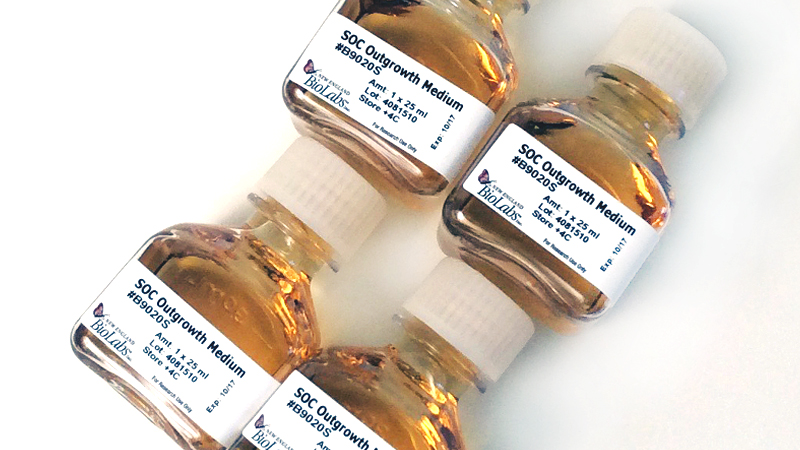NiCo21(DE3) Competent E. coli
Product information| Code | Name | Size | Quantity | Price | |
|---|---|---|---|---|---|
C2529H |
NiCo21(DE3) Competent E.coli |
20 x 0.05 ml | - | Unavailable in your region |
NiCo21(DE3) Competent E. coli
Having trouble opening your tubes? NEB Tube Opener can help!
Product Introduction
Chemically competent E. coli cells suitable for T7 expression with improved purity of target proteins isolated by IMAC.
- Superior alternative to BL21(DE3) for routine protein expression
- Deficient in proteases Lon and OmpT
- Resistant to phage T1 (fhuA2)
- Free of animal products
- No dry ice surcharge on competent cell shipments
| Catalog # | Size | Concentration |
|---|---|---|
| C2529H | 20.0 x 0.05 ml |
- Product Information
- Protocols, Manuals & Usage
- Tools & Resources
- FAQs & Troubleshooting
- Citations & Technical Literature
- Quality, Safety & Legal
- Other Products You May Be Interested In
Product Information
Description
Highlights
- Superior alternative to BL21(DE3) for routine protein expression
- Improved purity of target proteins isolated by IMAC
- Identical growth characteristics as BL21(DE3)
- Deficient in proteases Lon and OmpT
- Resistant to phage T1 (fhuA2)
- Free of animal products
Transformation Efficiency
1–5 x 107 cfu/µg pUC19 Chemically competent E. coli cells derived from BL21(DE3). Poly-histidine tagged recombinant proteins that are isolated by immobilized metal affinity chromatography (IMAC) are often contaminated with significant amounts of endogenous E. coli metal binding proteins. The protein expression strain NiCo21(DE3) has been engineered to minimize E. coli protein contamination of IMAC fractions: GlmS is mutated to eliminate binding to IMAC resins and three other proteins (SlyD, ArnA and Can) are tagged to enable rapid removal by chitin affinity chromatography.Genotype
can::CBD fhuA2 [lon] ompT gal (λ DE3) [dcm] arnA::CBD slyD::CBD glmS6Ala ∆hsdS λ DE3 = λ sBamHIo ∆EcoRI-B int::(lacI::PlacUV5::T7 gene1) i21 ∆nin5- This product is related to the following categories:
- Nickel Purification (His-tag),
- T7 Expression,
- Affinity Purification Products,
- Protein Purification Products,
- E. coli Protein Expression Strains Products,
- Protein Expression Products,
- E. coli Expression Strains Products,
- This product can be used in the following applications:
- His-tagged Protein Expression & Purification,
- Affinity Purification & Expression Tags,
- Protein Purification,
- T7 Expression,
- Peptide Ligation,
- Protein Expression in E. Coli, Protein Expression
Reagents Supplied
Reagents Supplied
The following reagents are supplied with this product:
| NEB # | Component Name | Component # | Stored at (°C) | Amount | Concentration | |||||||||||||||||||||||||
|---|---|---|---|---|---|---|---|---|---|---|---|---|---|---|---|---|---|---|---|---|---|---|---|---|---|---|---|---|---|---|
| ||||||||||||||||||||||||||||||
Properties & Usage
Antibiotic for Plasmid Selection
| Antibiotics for Plasmid Selection | Working Concentration |
|---|---|
| Ampicillin | 100 µg/ml |
| Carbenicillin | 100 µg/ml |
| Chloramphenicol | 33 µg/ml |
| Kanamycin | 30 µg/ml |
| Streptomycin | 25 µg/ml |
| Tetracycline | 15 µg/ml |
Shipping Notes
- Ships on dry ice
Features
- Improved purity of target proteins isolated by IMAC
Application Features
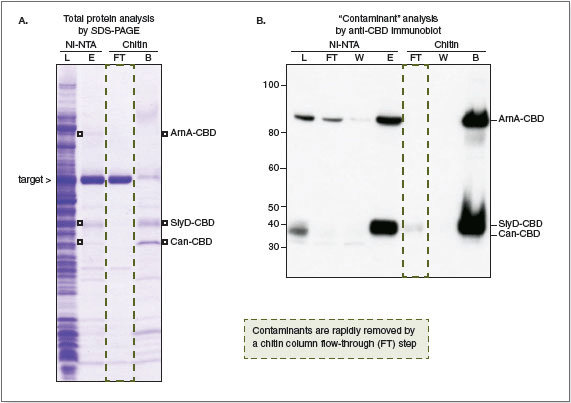
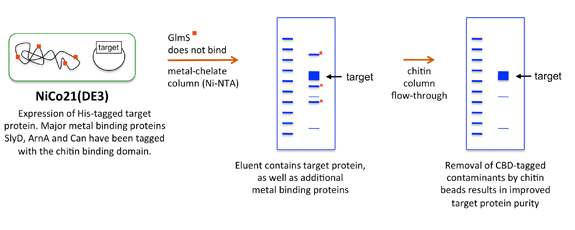
Related Products
Companion Products
- BL21 Competent E. coli
- Lemo21(DE3) Competent E. coli
- BL21(DE3) Competent E. coli
- Chitin Resin
- Anti-CBD Monoclonal Antibody
- Chitin Magnetic Beads
- 6-Tube Magnetic Separation Rack
- 12-Tube Magnetic Separation Rack
- 96-Well Microtiter Plate Magnetic Separation Rack
Materials Sold Separately
Product Notes
- CAUTION: This product contains DMSO, a hazardous material. Review the MSDS before handling.
- STORAGE AND HANDLING: Competent cells should be stored at -80°C. Storage at -20°C will result in a significant decrease in transformation efficiency. Cells lose efficiency whenever they are warmed above -80°C, even if they do not thaw.
References
- Bolanos-Garcia and Davies (2006). Biochimica et Biophysica Acta. 1760, 1304-1313.
- Carine Robichon, Jianying Luo, Thomas B. Causey, Jack S. Benner, and James C. Samuelson (2011). Applied and Environmental Microbiology. 77, 4634-4646.
Protocols, Manuals & Usage
Protocols
Usage & Guidelines
Tools & Resources
Selection Charts
FAQs & Troubleshooting
FAQs
- Does New England Biolabs offer strains of Competent E.coli suited for protein expression?
- What are the solutions/recipes (C2529)?
- Why are there no colonies or no growth in liquid culture (C2529)?
- Why is the induced protein insoluble (C2529)?
- Why is there no protein visible by SDS-PAGE or no activity (C2529)?
- What are the strain properties (C2529)?
- Can I store competent cells at -20°C instead of -80°C?
- Which kind of transformation tubes should be used?
- What volume of DNA can be added into competent cells?
- What is the shelf life for this strain (NEB #C2529H)?
- Are NEB's competent cells compatible with the “Mix & Go" protocol?
- How should I store SOC Outgrowth Medium? The SOC I received with my competent cells recommends storage at either room temperature or 4°C, however, when I purchase it as a stand alone product, it recommends storing it at 4°C. Which is better?
- Is T7 expression subject to catabolite repression in BL21(DE3) and derivative strains?
- What expression plasmids can be used with NiCo21(DE3)?
Citations & Technical Literature
Citations
Additional Citations
Quality, Safety & Legal
Quality Assurance Statement
Quality Control tests are performed on each new lot of NEB product to meet the specifications designated for it. Specifications and individual lot data from the tests that are performed for this particular product can be found and downloaded on the Product Specification Sheet, Certificate of Analysis, data card or product manual. Further information regarding NEB product quality can be found here.Specifications
The Specification sheet is a document that includes the storage temperature, shelf life and the specifications designated for the product. The following file naming structure is used to name these document files: [Product Number]_[Size]_[Version]Certificate Of Analysis
The Certificate of Analysis (COA) is a signed document that includes the storage temperature, expiration date and quality controls for an individual lot. The following file naming structure is used to name these document files: [Product Number]_[Size]_[Version]_[Lot Number]- C2529H_v1_0121606
- C2529H_v1_0111607
- C2529H_v1_0111609
- C2529H_v1_0121611
- C2529H_v1_0121612
- C2529H_v1_0121702
- C2529H_v1_0121704
- C2529H_v1_0131708
- C2529H_v1_0131710
- C2529H_v1_0131712
- C2529H_v1_0131801
- C2529H_v1_0131803
- C2529H_v1_0141804
- C2529H_v1_10010695
- C2529H_v1_10012784
- C2529H_v1_10015496
- C2529H_v1_10019856
- C2529H_v1_10022386
- C2529H_v1_10025362
- C2529H_v1_10030704
- C2529H_v1_10034654
- C2529H_v1_10035219
- C2529H_v1_10036761
- C2529H_v1_10041915
- C2529H_v1_10045309
- C2529H_v1_10046514
- C2529H_v1_10047052
- C2529H_v1_10051590
- C2529H_v1_10056811
- C2529H_v1_10057515
- C2529H_v1_10058329
- C2529H_v1_10062924
- C2529H_v1_10069273
- C2529H_v1_10075750
- C2529H_v1_10077815
- C2529H_v1_10079695
- C2529H_v1_10081239
- C2529H_v1_10084666
- C2529H_v1_10085396
- C2529H_v1_10087259
- C2529H_v1_10090048
- C2529H_v1_10093042
- C2529H_v1_10096565
- C2529H_v1_10100041
- C2529H_v1_10101041
- C2529H_v1_10101758
- C2529H_v1_10102722
- C2529H_v1_10108146
- C2529H_v1_10115078
- C2529H_v1_10120003
- C2529H_v1_10122533
- C2529H_v1_10125846
- C2529H_v1_10132450
- C2529H_v1_10139853
- C2529H_v1_10140751
- C2529H_v1_10145693
- C2529H_v1_10150684
- C2529H_v1_10151131
- C2529H_v1_10153043
- C2529H_v1_10158009
- C2529H_v1_10162568
- C2529H_v1_10166317
- C2529H_v1_10172513
- C2529H_v1_10175372
- C2529H_v1_10179682
- C2529H_v1_10183638
- C2529H_v1_10189856
- C2529H_v1_10193327
- C2529H_v1_10200646
- C2529H_v1_10206080
- C2529H_v1_10210988
- C2529H_v1_10225442
- C2529H_v1_10227503
- C2529H_v1_10237223
Safety DataSheets
The following is a list of Safety Data Sheet (SDS) that apply to this product to help you use it safely.NiCo21(DE3) Competent E. coli
pUC19 Vector
SOC Outgrowth Medium
Legal and Disclaimers
Products and content are covered by one or more patents, trademarks and/or copyrights owned or controlled by New England Biolabs, Inc (NEB). The use of trademark symbols does not necessarily indicate that the name is trademarked in the country where it is being read; it indicates where the content was originally developed. The use of this product may require the buyer to obtain additional third-party intellectual property rights for certain applications. For more information, please email [email protected].This product is intended for research purposes only. This product is not intended to be used for therapeutic or diagnostic purposes in humans or animals.
New England Biolabs (NEB) is committed to practicing ethical science – we believe it is our job as researchers to ask the important questions that when answered will help preserve our quality of life and the world that we live in. However, this research should always be done in safe and ethical manner. Learn more.
Licenses
Information for Non-U.S. CustomersFor European Customers
The NiCo21(DE3) E.coli strain is genetically modified to carry the can::CBD, arnA::CBD and slyD::CBD gene fusions. The CBD (chitin binding domain) DNA sequence originates from Bacillus circulans. As a condition of sale, this product must be in accordance with all applicable local legislation and guidelines including EC Directive 90/219/EEC on the contained use of genetically modified organisms.
For All Other Non-U.S. Customers
The parental strain of NiCo21(DE3) E. coli is BL21(DE3) (derivative of E.coli B, Delbrück and Luria, 1942). Although the parental strain is generally classified as Biosafety Level 1 (BL-1), we recommend that you consult the safety department of your institution to verify the Biosafety Level.
Other Products You May Be Interested In
The supporting documents available for this product can be downloaded below.
Protocol
Expression Using NiCo21(DE3) (C2529)
Protocol
Expression Using NiCo21(DE3) (C2529)
Protocol
Expression Using NiCo21(DE3) (C2529)
